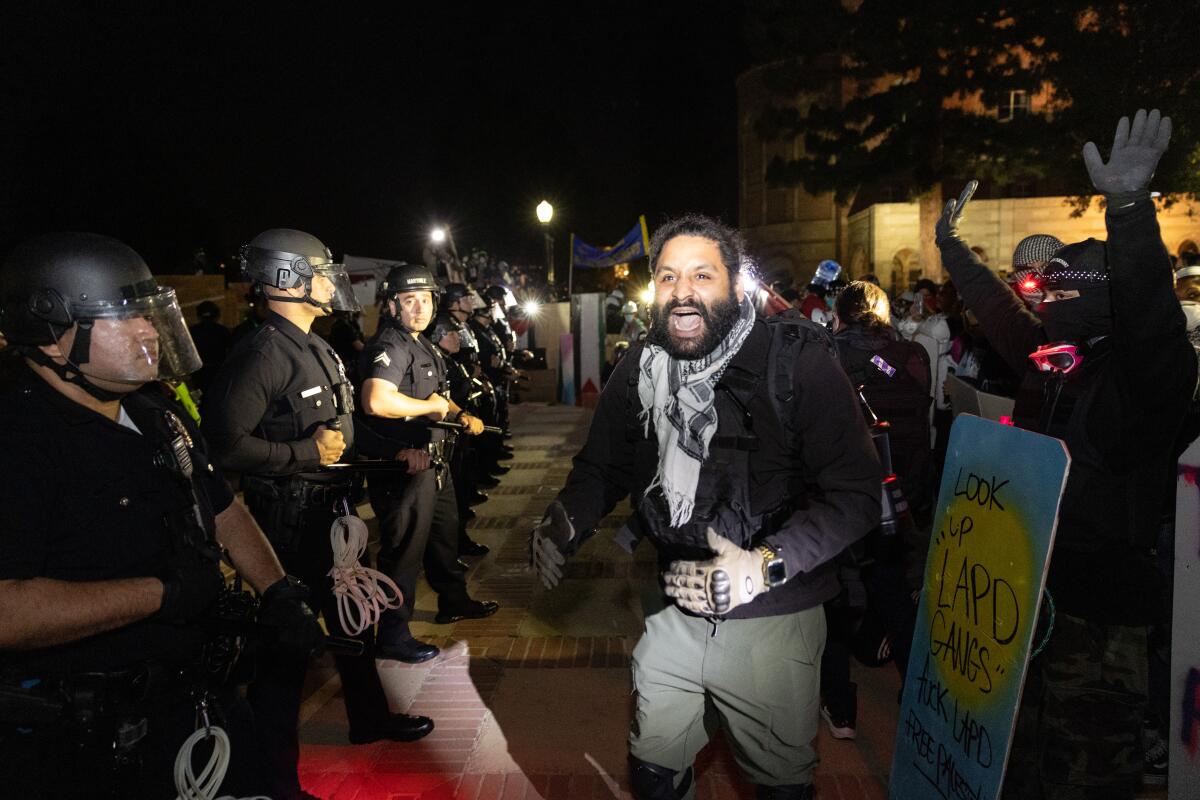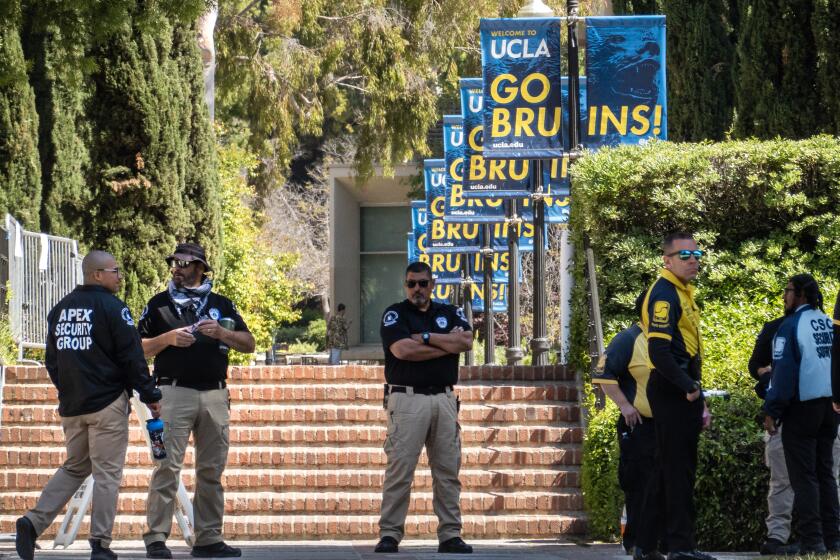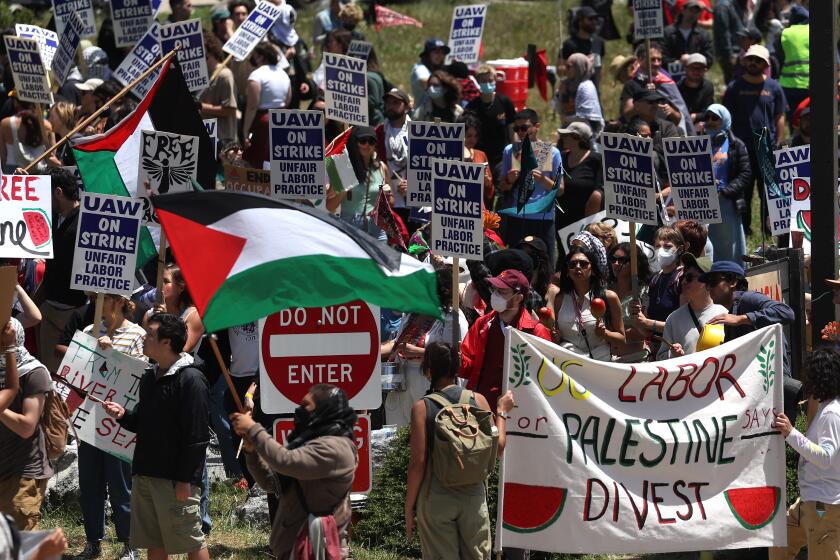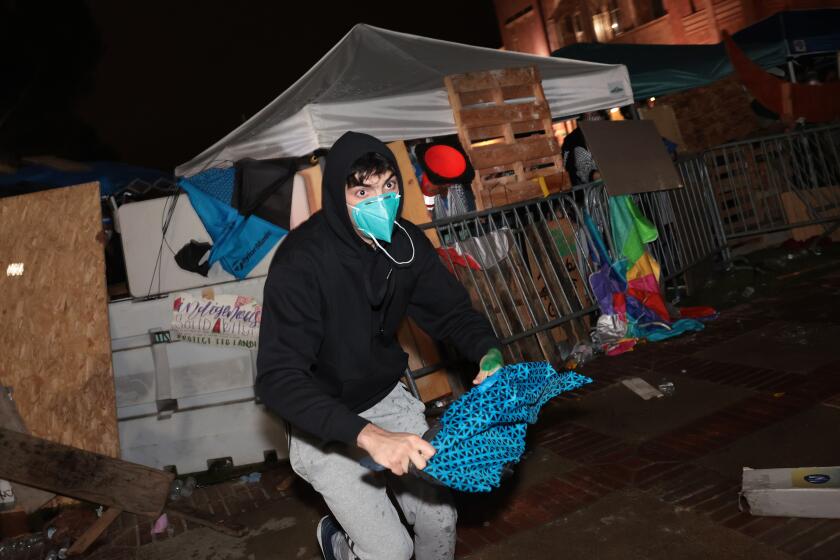Tension, distrust, anxiety pervade UCLA. ‘Everywhere you turn there’s a security guard’

- Share via
Weeks of protests, violence, massive police actions and now a strike have taken a toll on the UCLA campus community, leaving many students overwhelmed, anxious and still struggling to make sense of the events.
The unrelenting whirl of police and news helicopter rotors continued for days in early May as the pro-Palestinian encampment on campus was violently attacked and then dismantled. Tense and boisterous campus protests have taken over gathering areas. Last week, academic workers began to picket on campus, disrupting some classes and office hours as students prepared for finals.
Much of the focus has been on protesting students and those involved at the pro-Palestinian encampment, and the later, related strike. But they represent only a fraction of some 41,000 undergraduate and graduate students, the majority of whom have navigated the campus these last few weeks primarily as observers.
Many are sympathetic to the events unfolding in Gaza but decided not to actively protest. Others have been concerned by what they consider anti-Jewish sentiments or by ideas and stances appearing biased, circulating through an almost echo chamber. Some feel caught in the middle. Many have simply chosen to remain focused on schoolwork.
When classes went virtual and libraries closed during the encampment crackdown, students struggled to find a place on the Westwood campus that was quiet enough to focus, much less take an online class or exam. Several said they felt a constant pull between their course work and trying to keep up with the news — about what was unfolding on campus and in a war taking place thousands of miles away. During the worst moments, it was hard to sleep or keep up with studies, they said. Some turned to UCLA’s mental health services for support.
A few students told The Times they avoided campus when the protests and resulting backlash became too intense. The massive security presence — some of them uniformed police and others, private guards — that appeared in recent weeks left them unsettled.
“Midterms were really the last of many people’s concerns,” said Lena Schorkopf, a senior political science major, who became involved in the protests after the encampment was attacked. “It felt as though there were bigger issues in the world and within our own campus so even the thought of going in and taking a test on something completely unrelated to that was just unfathomable.”
Hours of violence that unfolded overnight at a pro-Palestinian encampment set up on UCLA’s campus prompted administrators to cancel classes on Wednesday and has triggered questions about authorities’ response.
Many Bruins whose affiliation with the protests was either limited or nonexistent are grappling with the aftermath of a chaotic academic year punctuated by demonstrations, violence and, most recently, a union strike by academic workers rooted in the treatment of student protesters. Some said the events have eroded their trust in UCLA administrators over their handling of the unrest, particularly the lack of security when a mob attacked the camp overnight April 30 and it took hours for police to intervene.
Less than 24 hours after the attack, scores of officers descended on the campus, arresting more than 200 people, including many students, and tearing down the encampment. When students set up a new encampment last week, campus leaders quickly called on police to push them out.
The increased security on the 419-acre campus, which was designed to feel like a “college in a garden,” has translated into an uncomfortable mood on campus, students say.
“Everywhere you turn there’s a security guard,” Schorkopf said. “It almost feels like the university has become somewhat of an oppositional force against its students.”
Witnesses accused guards from Apex Security Group of acting aggressively at UCLA in recent weeks, including one incident where a student protester was punched in the face.
Although college protests against the Israel-Hamas war in Gaza have grabbed headlines across the country, U.S. college students surveyed in a Generation Lab poll in early May ranked the conflict in the Middle East as the least important issue they faced — behind topics including healthcare reform, educational funding and access, economic fairness, racial justice, climate change and gun control.
But at UCLA, concern over the growing Palestinian humanitarian crisis and the lingering effects on campus have remained at the center of student life weeks after the encampment was dismantled.
Outside Royce Hall last week, striking graduate students mingled in the grass, taking a break from rallies and chants, such as “UC, UC, you’re no good, treat your students like you should.” The members of the United Auto Workers Local 4811, which represents more than 6,200 workers at UCLA, walked off the job last week, alleging that their rights were violated by the University of California’s actions during pro-Palestinian protests and encampment crackdowns.
The walkout unfolds at a crucial time in the academic year, as classes end and capstone projects, finals and grading are ahead — work in which union members play a key role. Most held signs accusing the university of unfair labor practices, while a few carried posters focused on the pro-Palestinian cause. Tour groups and students walked by, occasionally looking over their shoulders or taking photos of the campus’ latest demonstration.
The unique demands made by UC academic workers union have labor experts debating over how the widely watched strike could come to an end.
A few hundred feet away down the Tongva steps, students lounged on a hill under the sun. They typed on laptops and listened to music, the sounds of the picket line echoing faintly in the distance.
Private security guards stood by surveying the situation. Schorkopf counted them. “Seven,” she said with a slight chuckle of disbelief. “All that for a very nonthreatening presence of students.”
“This campus has essentially become a police state,” Elisa Pabon, the postdoctoral unit chair for the union, said gesturing to uniformed security guards standing nearby.
Backlash from the university and the larger community for participating in protests and the encampment has tempered students’ desires to be public about their opinions on the war in Gaza. Doxxing, in which someone reveals personal information about another online typically for nefarious purposes, is a serious concern for students, many of whom don’t want their names attached to an opinion on the war or what’s happened on campus.
Most undergrads at UCLA had a high school experience tainted by the isolation of the COVID-19 pandemic. They’ve come into adulthood as the nation’s political divide has exploded. They were keenly aware of the murder of George Floyd by Minneapolis police, followed by months of protests against racism and police abuse. Now they are confronted with the raw brutality of war.
Some clubs on campus have hosted forums for discussion about the war protests. A handful of professors have devoted class time for students to voice their opinions. Whereas some have been open to share, even crying during discussions, others have stayed quiet. Some prefer to be vulnerable in spaces where they won’t be subject to judgment or ridicule.
Adam Tfayli, student body president, said regardless of where people stand on the conflict he’s found general agreement that the violence unleashed on the encampment at UCLA was unacceptable.
“The general consensus I’ve heard is that what occurred on April 30 was a complete violation of students’ rights and it was in large part the fault of the administration slash campus police,” he said.
UCLA’s mental health services have increased the number of drop-in sessions to counsel individual students over the last two months in recognition that the events have been “emotionally trying, and in some cases very overwhelming, for many of our students,” Nicole Green, senior executive director of student resilience and mental health services, said in a prepared statement.
“Not all students react the same, and we have seen them express a wide array of emotions, from distress and anger over events and feelings of guilt over not having been more closely involved. We have even seen some students who feel disconnected from what has been happening on campus. While many students have managed to continue with their normal routines, others have experienced — and continue to experience — heightened stress, anxiety, frustration and grief,” Green said.
Here is what we know about the last couple of weeks on campus, based on interviews, recordings, social media and documents.
Zoe Yeh, a biochemistry major who wasn’t directly involved in the protests but dropped off supplies for students at the encampment, said watching what unfolded on campus made her want to better keep up with the situation in the Middle East.
“But even as you become more educated, I don’t know what I could do to get involved that would actually make a [difference],” she said.
Since the encampment began, Yeh said, there have been more conversations about the protests and global affairs among her peers — which she thinks is positive. But she also noticed that people have become more argumentative.
The events “have caused people to stop ignoring,” what’s going on, said a second-year biology major who didn’t want to share her name with The Times because her family didn’t want her taking a public stance. The campus is “not as neutral as it’s been before,” she said.
Some students say it’s impossible to avoid the conflict.
Jason Kohan, a junior majoring in economics, said some of his professors and teaching assistants have brought up what was happening in Gaza during class, which he found inappropriate, especially when courses have no clear link to the Middle East.
“I feel like they don’t have a lot of knowledge about the subjects sometimes that they’re talking about,” Kohan said, adding that he wants people to understand “both sides of the story,” not just the Palestinian perspective.
Schorkopf, the political science major, said despite the turmoil on campus she’s reflecting on what she’ll carry with her as she prepares to leave UCLA.
“As tragic and upsetting as these past few weeks have been I feel like this time at UCLA has been some of the most educationally enriching,” she said. “A lot of what we deal with is just theory in the classroom and it feels really inapplicable and then here we are seeing those same theories and ideas about activism and decolonization actually play out.”
More to Read
Sign up for Essential California
The most important California stories and recommendations in your inbox every morning.
You may occasionally receive promotional content from the Los Angeles Times.

















